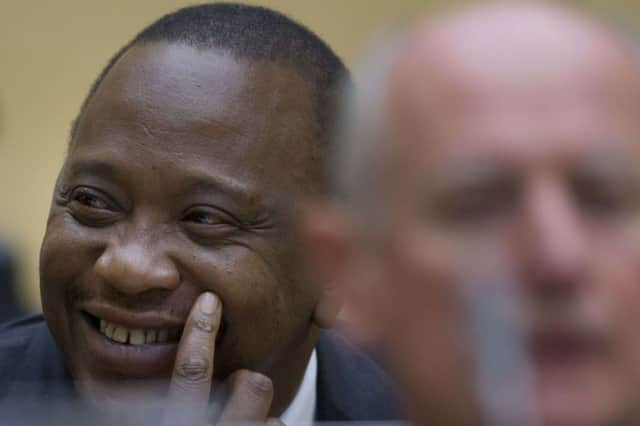Kenyatta goes to ICC and demands case be dropped


They asked for him to be acquitted, saying the prosecution has collapsed and cannot be resurrected.
Prosecutors said they do not have enough evidence to prosecute Uhuru Kenyatta for his alleged role in instigating and funding violence that left more than 1,000 people dead and forced 600,000 people from their homes after Kenya’s 2007 presidential elections.
Advertisement
Hide AdAdvertisement
Hide AdThey blame Kenyatta’s government for obstructing their investigation by failing to turn over potential evidence, including phone records, tax returns and bank account details. “This case has failed and it has failed in a way that means there is no prospect of it going further,” Kenyatta’s defence lawyer Steven Kay told a three-judge panel. “If the prosecutor does not intervene, you act to terminate.”
Kenyatta’s case has touched on the fundamental issue of how the world’s first permanent international criminal court can successfully prosecute government leaders when it often has to rely on the co-operation of the same governments in gathering evidence.
Kenya’s attorney general told the court on Tuesday that prosecution requests for evidence are not detailed enough for him to act on.
Prosecution trial lawyer Benjamin Gumpert cautioned judges that scrapping the case now would send a worrying message to other governments who could face prosecution in the future.
Mr Gumpert said such a decision would be interpreted as “the court saying that if a country sticks out for long enough obstructing proper inquiries being made by the prosecution then the case will go away.”
That interpretation “would be disastrous,” he added.
The prosecution has asked the judges to adjourn the case until Kenya fully co-operates.
Kenyatta’s trial was due to start on Tuesday after lengthy delays, but judges granted prosecutors a postponement because of the lack of evidence.
The trial has twice been postponed and no starting date has been set. The prosecutors’ case has been weakened by witnesses refusing to testify or recanting their statements.
Advertisement
Hide AdAdvertisement
Hide AdThe issue of obtaining evidence against heads of state goes to the heart of problems at the world’s first permanent war crimes tribunal – it has no police force and relies on member states for assistance in investigations and arresting suspects.
“The way the judges deal with the co-operation issue has significant implications for the court,” said Elizabeth Evenson of Human Rights Watch. “The judges will need to take whatever decisions they think necessary to bring full co-operation.”
Kenyatta this week temporarily handed the presidency to his deputy to avoid becoming the first sitting head of state to appear at the court – although his deputy, William Ruto, is already on trial at the Hague-based court for his own alleged involvement in the post-election violence in 2007 and 2008.